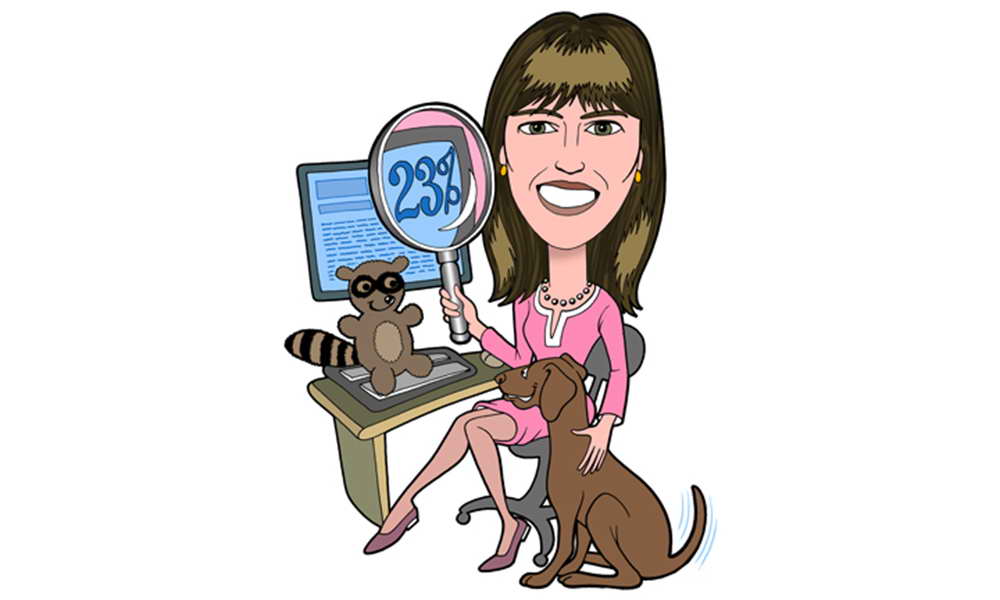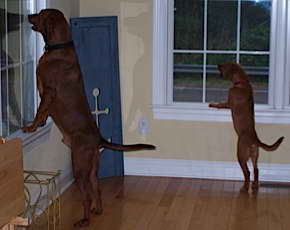February 16, 2010
2/16: Are You Smarter Than Your Dog?
Statistically speaking, according to Stanley Coren, a psychology professor at the University of British Columbia and author of a number of books on dog intelligence, we begin to outpace our four legged friends, intellectually, at about the age of two. But, that’s not to say our comparative species strengths and weaknesses can make us humans, well, feel far less than the leader of the pack.
 I have owned (and been owned by) many dogs and credit them with a great deal of intellectual savvy. After all, if they are not gifted hounds, what does that say about me? Perhaps, I have just been well trained. I provide treats, walks, outings, and even a favorite chair on command. I suspect I am more than a circus spectacle, when at the sound of a scratch or a squeal, I crawl under furniture or relocate appliances to retrieve balls, bones, or thoroughly unrecognizable pieces of delightfully smelling remains. I jump to see who is visiting at the sound of dancing feet and a welcoming howl and sprint to the backyard looking for treed prey when I hear a mournful bawl.
I have owned (and been owned by) many dogs and credit them with a great deal of intellectual savvy. After all, if they are not gifted hounds, what does that say about me? Perhaps, I have just been well trained. I provide treats, walks, outings, and even a favorite chair on command. I suspect I am more than a circus spectacle, when at the sound of a scratch or a squeal, I crawl under furniture or relocate appliances to retrieve balls, bones, or thoroughly unrecognizable pieces of delightfully smelling remains. I jump to see who is visiting at the sound of dancing feet and a welcoming howl and sprint to the backyard looking for treed prey when I hear a mournful bawl.
Dogs take their responsibilities quite seriously, too. They are alarm clocks, doorbells, security lights, and a dining room vacuum cleaner. There’s also nothing like a herding breed if you do not want your guests or children to leave the room. And, I have known a hound or two to corner a house guest in the bathroom. Some of my dogs have enjoyed TV, big screen, of course, and have looked front to back to front again for the barking retriever. Is it a sign of failed intelligence? Not so. After all, I’ve been known on occasion while watching football games to scream out holding penalties to the refs.
Regardless of whether you are a disciple or skeptic of canine intelligence, there’s no denying their abilities. Most dogs have an impressive vocabulary. Not just stay and come, sit and down, but important associations with people’s names, toys, outside, car rides, time to eat, play, smile, hug, snuggle, clean up, sleep, go upstairs or down them, and Pup-Peroni. Once learned, even spelling will only get you by once or twice. O-U-T is no disguise and creates just as much anticipatory havoc as the utterance of the word “out.”
Most Americans, according to the latest Marist Poll, believe dogs are smarter than we give them credit. Recent psychological and behavioral research points to an expanding potential in the relationship between people and dogs. Our canine counterparts can search and rescue, detect bombs and drugs, alert us to seizures or cancer, be guides and eyes, provide psychiatric service for anxiety, panic attacks, and post-traumatic stress, be best friends, and loyal companions.
But, intelligence doesn’t always mean easy to train. In fact, the most intelligent breeds often present the greatest challenges to mere mortals, like myself. It’s not that they don’t understand what’s expected, it’s just that they can figure out a better way to do it. If it matters to your canine relationship which one of you is more intelligent, don’t be fooled by a pretty face. Some personal soul searching into your habits and daily routines combined with a little research into the instincts and inclinations of a breed can go a long way to helping you find a perfect, life-long match.
Related Links:
Dr. Stanley Coren – Disciple – https://www.stanleycoren.com/
Coren’s Top Ten Breeds https://www.stanleycoren.com/e_intelligence.htm
Dr. Clyde Wynne – Skeptic – https://www.psych.ufl.edu/~wynne/psychology/Welcome.html
Julianne Kaminski – Researcher – https://www.sciencenews.org/view/generic/id/41972/title/Dogs_show_a_fetching_communication_savvy
https://en.scientificcommons.org/juliane_kaminski
Lee Charles Kelley – Dog trainer – https://www2.psychologytoday.com/blog/my-puppy-my-self/200904/tuning-in-your-dogs-emotions



